最新译林版小学四年级英语下册-知识点复习总结-(1)
译林版四年级英语知识点
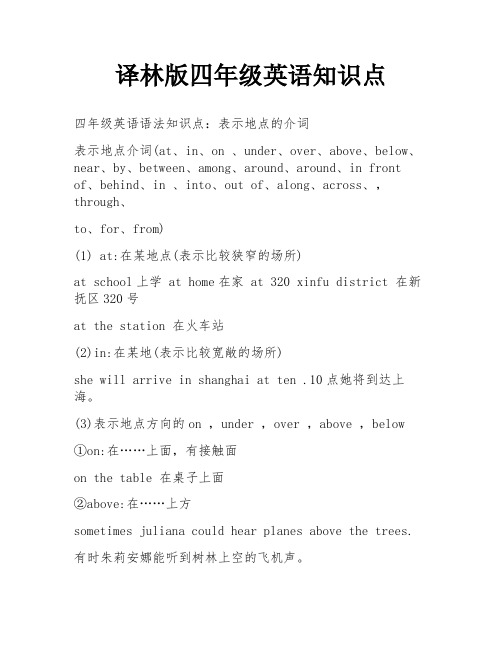
译林版四年级英语知识点四年级英语语法知识点:表示地点的介词表示地点介词(at、in、on 、under、over、above、below、near、by、between、among、around、around、in front of、behind、in 、into、out of、along、across、,through、to、for、from)(1) at:在某地点(表示比较狭窄的场所)at school上学 at home在家 at 320 xinfu district 在新抚区320号at the station 在火车站(2)in:在某地(表示比较宽敞的场所)she will arrive in shanghai at ten .10点她将到达上海。
(3)表示地点方向的on ,under ,over ,above ,below①on:在……上面,有接触面on the table 在桌子上面②above:在……上方sometimes juliana could hear planes above the trees.有时朱莉安娜能听到树林上空的飞机声。
③over:在……正上方,是under的反义词over these tombs ,they built pyramids .在这些坟墓上,他们建起了金字塔。
④under:在……下面,在……之内the twin sisters put the basket under the tree .这姐俩把篮子放到了树下。
⑤below:在……下方,(不一定是正下方)three thousand metres below her ,she could see nothing except the thick jungle .3000米以下,除了茂密的丛林之外,她什么也看不见。
四年级英语语法知识点表示地点的介词between ,among ,around①between:在两者之间the differences between american english and british english are not very great .美国英语和英国英语之间的差别不是很大。
四年级下册英语第四单元知识点总结(一)

四年级下册英语第四单元知识点总结(一)前言在四年级下册英语学习的第四单元中,我们学习了许多重要的知识点。
这些知识点涵盖了词汇、语法和阅读理解等方面,对我们提高英语能力和运用英语进行交流非常有帮助。
接下来,我将对这些知识点进行总结和归纳,以供大家参考。
正文1. 词汇在这一单元中,我们学习了许多新的词汇,包括动物、食物、水果等。
通过课堂的练习和课外的记忆,我们能够更好地理解和运用这些词汇,扩大我们的词汇量。
2. 语法在语法方面,我们学习了以下几个重点:•一般现在时–表示现在的状态或经常性的动作。
–句子构成:主语 + 动词。
–例句:I eat breakfast every morning.(我每天早上吃早餐。
)•句型转换–由肯定句转变为否定句:在动词前加上“don’t”或“doesn’t”。
–例句:I like apples. → I don’t like apples.(我喜欢苹果。
→ 我不喜欢苹果。
)•疑问句的构成–由动词开头,其后加上主语。
–例句:Do you like bananas?(你喜欢香蕉吗?)3. 阅读理解阅读理解是英语学习中非常重要的一部分,通过阅读能够提高我们的阅读能力和理解能力。
在这一单元中,我们通过阅读文章来了解动物们的生活习性和特征,从而拓宽了我们的知识面。
结尾通过本单元的学习,我们对英语的词汇和语法有了更深入的了解,同时也提高了阅读理解的能力。
希望大家能够在以后的学习中继续努力,不断提升自己的英语水平。
谢谢大家!前言在四年级下册英语学习的第四单元中,我们学习了许多重要的知识点。
这些知识点涵盖了词汇、语法和阅读理解等方面,对我们提高英语能力和运用英语进行交流非常有帮助。
接下来,我将对这些知识点进行总结和归纳,以供大家参考。
正文1. 词汇在这一单元中,我们学习了许多新的词汇,包括动物、食物、水果等。
通过课堂的练习和课外的记忆,我们能够更好地理解和运用这些词汇,扩大我们的词汇量。
四年级下册英语 Unit 1 Our school subjects知识梳理+巩固练习 译林版三起

Unit 1 Our school subjects知识梳理+巩固练习(含答案)一、语音解析:字母a在单词中发/eɪ/,例如:例如:c a ke, gr a pe, m a ke, sk a te二、重点单词四会school学校subject课程see看见,看到Chinese语文(课)Maths数学(课)Art美术(课)Music音乐(课)lesson课Monday星期一三会timetable课程表;时间表PE体育(课)Science科学(课)fun乐趣,快乐playground操场afternoon下午三、核心短语our school subjects我们学校的课程see you见到你Chinese and Maths语文和数学what subjects什么课程like English喜欢英语time for PE该上体育课的时间Art and Music美术和音乐what lessons什么课have Music and Maths有音乐课和数学课my school subjects我学校的课程back to school回到学校our new timetable我们的新课程表Music and Science音乐和科学go to the play9 round去操场this morning/afternoon今天早上/下午like PE喜欢体育课don't like that不喜欢那个don't skate不要滑冰make a cake做一个蛋糕at school在学校四、重点句型1. Welcome back to school,class.知识点:“Welcome back to十表示地点的名词。
”欢迎回到某地用法:如果后面所接地点为副词,则要省略to。
当表达“欢迎来到某地”时,则要将back去掉,直接说“Welcome to十表示地点的名词.”。
例句:(1)Welcome back to Beijing.(2)Welcome back home.(3)Welcome to my home.2. Nice to see you, Miss Li.知识点:“Nice to see you.”意为“很高兴见到你”用法:是有一段时间未见面的熟人再次相见时的问候语,也可以表达为“Glad to see you.”,其答句为“Nice/Glad to see you too.”但若双方是初次见面,则要用“Nice/Glad to meet you.”来问候。
译林英语四年级下的知识点及语法

译林英语四年级下的知识点及语法译林版小学英语四年级下册知识要点Unit1 Our school subjects词汇school subject see Chinese Maths Art Music lesson Monday PE Science fun go to playground afternoon句型What subject do you like? 你喜欢什么科目?I like English. How about you? 我喜欢英语。
那你呢?I like Science. 我喜欢科学。
Welcome back to school. 欢迎回到学校。
What lessons do you have in the afternoon? 你们下午有什么课?Unit2 After school词汇Wednesday Saturday Sunday Tuesday Thursday Friday get up 起床after school 放学后go match today whenevery day每天句型I have…我有……He/She has…他/她有……We don’t have…我们没有……What day is it today? 今天星期几?It’s Monday. 今天星期一。
What a pity! 真遗憾!All right. 好的。
Unit3 My day词汇usually经常go to school 去上学in the morning 在上午in the afternoon 在下午go home 回家homework watch TV 看电视in the evening在晚上have lunch 吃中饭have dinner 吃晚饭go to bed 睡觉at night在夜里句型when do you go to bed? 你什么时间睡觉?I go to bed at nine. 我9点睡觉Unit4 Drawing in the park词汇park draw flower them boat river lakedrawing easy difficult try hill again句型what can you see? 你能看到什么?I can …我能……Good idea! 好主意!Unit5 Seasons词汇seasons spring warm summer hot autumn cool winter coldfly kite放风筝go boating 去划船go swimming 去游泳picnic go climbing 去爬山go skating 去滑冰fine whose句型in spring,it is warm 在春天里,它是暖和的。
译林版小学英语四年级下册知识点汇总
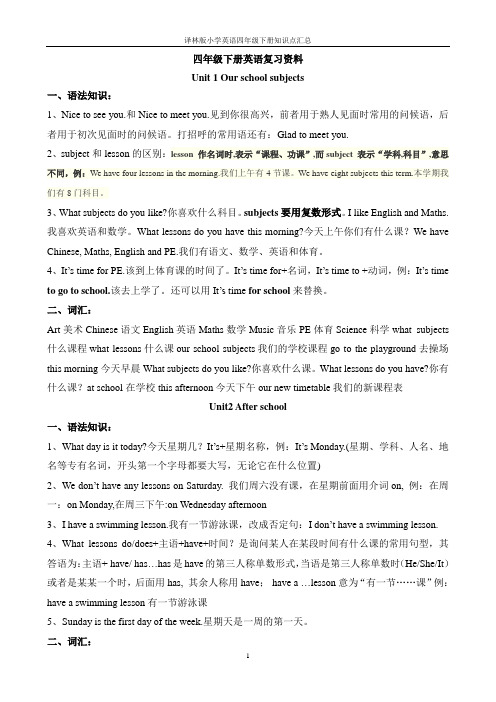
四年级下册英语复习资料Unit 1 Our school subjects一、语法知识:1、Nice to see you.和Nice to meet you.见到你很高兴,前者用于熟人见面时常用的问候语,后者用于初次见面时的问候语。
打招呼的常用语还有:Glad to meet you.2、subject和lesson的区别:lesson 作名词时,表示“课程、功课”,而subject 表示“学科,科目”,意思不同,例:We have four lessons in the morning.我们上午有4节课。
We have eight subjects this term.本学期我们有8门科目。
3、What subjects do you like?你喜欢什么科目。
subjects要用复数形式。
I like English and Maths.我喜欢英语和数学。
What lessons do you have this morning?今天上午你们有什么课?We have Chinese, Maths, English and PE.我们有语文、数学、英语和体育。
4、It’s time for PE.该到上体育课的时间了。
It’s time for+名词,It’s time to +动词,例:It’s time to go to school.该去上学了。
还可以用It’s time for school来替换。
二、词汇:Art美术Chinese语文English英语Maths数学Music音乐PE体育Science科学what subjects 什么课程what lessons什么课our school subjects我们的学校课程go to the playground去操场this morning今天早晨What subjects do you like?你喜欢什么课。
What lessons do you have?你有什么课?at school在学校this afternoon今天下午our new timetable我们的新课程表Unit2 After school一、语法知识:1、What day is it today?今天星期几?It’s+星期名称,例:It’s Monday.(星期、学科、人名、地名等专有名词,开头第一个字母都要大写,无论它在什么位置)2、We don’t have any lessons on Saturday. 我们周六没有课,在星期前面用介词on, 例:在周一:on Monday,在周三下午:on Wednesday afternoon3、I have a swimming lesson.我有一节游泳课,改成否定句:I don’t have a swimming lesson.4、What lessons do/does+主语+have+时间?是询问某人在某段时间有什么课的常用句型,其答语为:主语+ have/ has…has是have的第三人称单数形式,当语是第三人称单数时(He/She/It)或者是某某一个时,后面用has, 其余人称用have;have a …lesson意为“有一节……课”例:have a swimming lesson有一节游泳课5、Sunday is the first day of the week.星期天是一周的第一天。
新牛津译林版四年级下册英语全册知识点
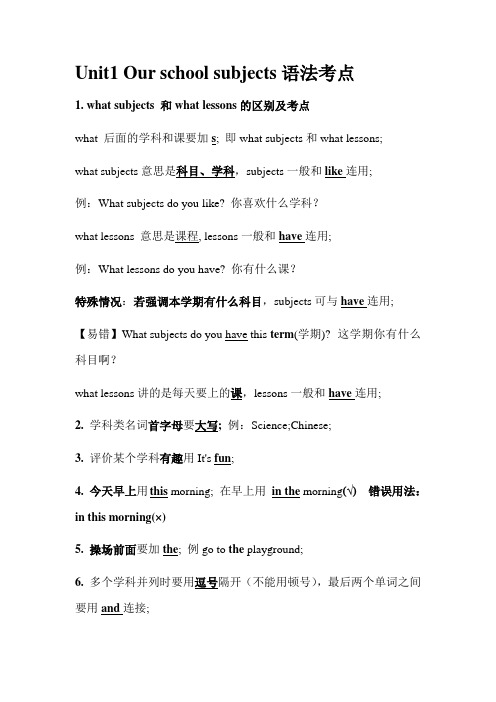
Unit1 Our school subjects语法考点1. what subjects 和what lessons的区别及考点what 后面的学科和课要加s; 即what subjects和what lessons;what subjects意思是科目、学科,subjects一般和like连用;例:What subjects do you like? 你喜欢什么学科?what lessons 意思是课程, lessons一般和have连用;例:What lessons do you have? 你有什么课?特殊情况:若强调本学期有什么科目,subjects可与have连用;【易错】What subjects do you have this term(学期)? 这学期你有什么科目啊?what lessons讲的是每天要上的课,lessons一般和have连用;2.学科类名词首字母要大写; 例:Science;Chinese;3. 评价某个学科有趣用It's fun;4. 今天早上用this morning; 在早上用in the morning(√) 错误用法:in this morning(×)5.操场前面要加the; 例go to the playground;6. 多个学科并列时要用逗号隔开(不能用顿号),最后两个单词之间要用and连接;例:We have Music, Art, PE and Maths.Unit2 After school语法考点1. 星期考点①星期一到星期天分别是(拼写):星期一Monday;星期二Tuesday;星期三Wednesday;星期四Thursday;星期五Friday;星期六Saturday;星期天Sunday;②英语中,一个星期的第一天是星期天;【易错】Sunday is the first(第一) day of a week(一周).③在星期几前面的介词用on; 即on + 星期几; 在星期几的上午或下午直接在星期后加morning或afternoon; 正确用法:on Sunday morning 在星期天上午(√) 错误用法:in the morning on Sunday(×)④对星期几提问特殊疑问词用What day; 回答星期几用It's + 星期几;2. It's time for / to考点(是时候做...)It’s time for后接名词例:It's time for school. school 为名词It's time to 后接动词词组例:It’s time to go to school. go to school为动词词组例:It’s time for lunch(名词). It’s time to have(动词) lunch.3. some、any 考点①some在部分疑问句和否定句中要改为any②用于征求对方意见并且希望得到肯定答复的时候,some无须改为any;总结为以下3种情况(1)Would you like some ... ? (2)What/How about some ... ? (3)Can I have some ...?4. like考点①like后接可数名词要用复数形式; 例:like mangoes②★能力题:like后接动词时要用动词ing形式; 例:like playing basketballUnit3 My day 知识点单词、词组、句子见书上1. 时间介词in, on, at 的考点in 考点①四季前介词用in, 中间不加任何冠词。
译林版小学四年级英语下册知识点复习总结
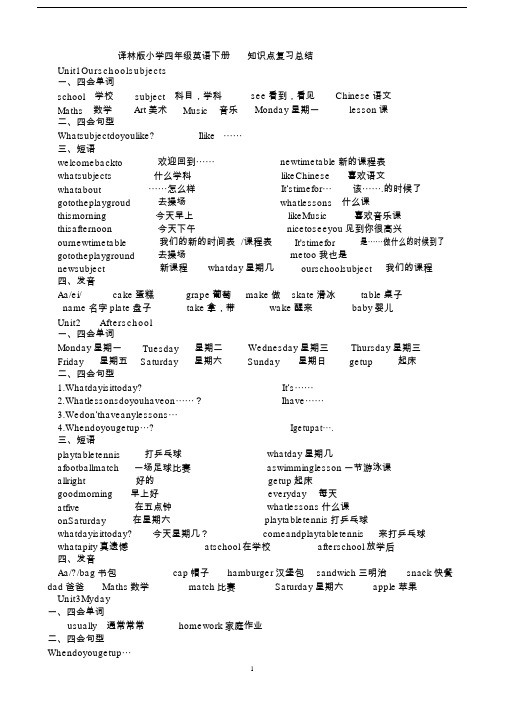
译林版小学四年级英语下册知识点复习总结Unit1Ourschoolsubjects一、四会单词school学校subject科目,学科see看到,看见Chinese语文Maths数学Art美术Music音乐Monday星期一lesson课二、四会句型Whatsubjectdoyoulike?Ilike⋯⋯三、短语welcomebackto欢迎回到⋯⋯newtimetable新的课程表whatsubjects什么学科likeChinese喜欢语文whatabout⋯⋯怎么样It’stimefor⋯该⋯⋯.的时候了gototheplaygroud去操场whatlessons什么课thismorning今天早上likeMusic喜欢音乐课thisafternoon今天下午nicetoseeyou见到你很高兴ournewtimetable我们的新的时间表/课程表It'stimefor是⋯⋯做什么的时候到了gototheplayground去操场metoo我也是newsubject新课程whatday星期几ourschoolsubject我们的课程四、发音Aa/ei/cake蛋糕grape葡萄make做skate滑冰table桌子name名字plate盘子take拿,带wake醒来baby婴儿Unit2Afterschool一、四会单词Monday星期一Tuesday星期二Wednesday星期三Thursday星期三Friday星期五Saturday星期六Sunday星期日getup起床二、四会句型1.Whatdayisittoday?It’s⋯⋯2.Whatlessonsdoyouhaveon⋯⋯?Ihave⋯⋯3.Wedon’thaveanylessons⋯4.Whendoyougetup⋯?Igetupat⋯.三、短语playtabletennis打乒乓球whatday星期几afootballmatch一场足球比赛aswimminglesson一节游泳课allright好的getup起床goodmorning早上好everyday每天atfive在五点钟whatlessons什么课onSaturday在星期六playtabletennis打乒乓球whatdayisittoday?今天星期几?comeandplaytabletennis来打乒乓球whatapity真遗憾atschool在学校afterschool放学后四、发音Aa/?/bag书包cap帽子hamburger汉堡包sandwich三明治snack快餐dad爸爸Maths数学match比赛Saturday星期六apple苹果Unit3Myday一、四会单词usually 通常常常homework家庭作业二、四会句型Whendoyougetup⋯1I getup⋯atsix/⋯三、短语gotoschool上学atsevenforty在七点四十分inthemorning在早上havelunch吃午饭intheafternoon在下午do myhomework做家庭作业havedinner吃晚饭everyday每天whattime什么时间overthere在那边abigcake一块大蛋糕likecakes喜欢蛋糕myday我的一天fourlessons四节课fivesubjects四门课程atseven在七点watchTV看电视gotobed睡觉playfootball踢足球intheevening在晚上atnight在夜里四、发音Ee/i:/me我she她green睡觉sleep睡觉three三week星期,周see看到meet遇见evening晚上Unit4Drawing inthe park一、四会单词park公园draw画flower花them他们,她们,它们boat小船river河,江lake湖,湖泊二、四会句型Whatcanyoudo?Icandraw/makeacake⋯/Goodnight.三、短语drawsomepictures画一些画goodidea好主意overthere那边someflowers一些花drawthem画它们ontheriver在河面上thisbigbox这只大盒子havealook看一看onthelake在湖面上tryagain再试一试inthepark在公园里somepictures一些图画welldone好样的,干得好canyoudraw你会画吗?intheboat在小船里drawinginthepark在公园里画画atree一棵树fivetrees五棵树onthehill在小山上seeaboat看到一条小船makeacake做一个蛋糕beforeten十点之前四、发音e/e/bed床desk课桌,书桌pen钢笔red红色的ten十friend朋友them他们pencil铅笔Wednesday星期三welcome欢迎Unit5Seasons一、四会单词season季节spring春天,春季warm温暖summer夏天hot热的,炎热的autumn秋天,秋季cool凉爽的,凉快的winter冬天,冬季cold冷的二、四会句型Itisspring/summer/autumn/winterItis⋯Igo⋯Ilike⋯三、短语inspring在春天flykites放风筝goboating去划船insummer在夏天eaticecream吃冰激凌go swimming去游泳2inautumn在秋天goclimbing去爬山makesnowmen堆雪人afineday晴朗的一天yourbag你的包lookat看⋯⋯.tooshort太短了toolong太长了sobig真大myfather’s我爸爸的sobeautiful真漂亮myhand我的手likespring喜欢春天afineday一个晴朗的日子verycold非常冷alllikethekite都喜欢这个风筝四、发音i/ai/Chinese语文kitefine晴朗的climb Unit6Whosedressisthis?havepicnics举行野餐inwinter在冬天goskating去滑冰yourjacket你的夹克衫whosebag谁的包mydress我的连衣裙yourtrousers你的裤子gototheparty去参加聚会whosegloves谁的手套whose dress谁的连衣裙canmove能移动fourseasons四个季节inautumn在秋天asunnyday一个晴朗的日子here’syourjacket这儿有你的夹克衫喜欢like喜欢time时间white白色的爬like喜欢lion狮子rice米饭一、四会单词dress连衣裙party聚会coat外衣,外套shirt(男士)衬衫sweater毛衣hand手二、四会句型1.Whose⋯isthis/that?It’smyfather’s⋯2.Whose⋯arethese/those?They’remyfather’s⋯3.Ithinkso.What’sthematter?三、短语whosedress谁的连衣裙lookatmysweater看我的毛衣trythis试试这个yourlongtrousers你的长裤trythese试试这些allright好的let’sgototheparty让我们去参加聚会lookatSuYang’sgloves看杨玲的手套sobig如此大myfather’scoat我爸爸的上mycousin’sdress我堂姐的连衣裙sobeautiful如此美丽you’rewrong你错了you’reright你对了canmove能动what’sthematter怎么了Ithinkso我认为是这样let’splay让我们玩吧beforeeatingfish在吃鱼之前listentosomeEnglish听一些英语eatmycakebythelake在湖边吃我的蛋糕readandwrite读和写四、发音i/i/English英语fish鱼him他(宾格)music音乐pig猪sixteen十六listen听picture野餐difficult困难的Unit7What’sthematter?一、四会单词bad爸爸water水ill生病tired累的,疲劳的happy快乐的,高兴的speak说话,讲话Mrs夫人,太太3二、四会句型1.What ’sthematter?Here ’ssome/a ⋯foryou. 2. Goodnight.三、短语haveapie 吃个馅饼gotobed 睡觉 allright 好的what ’sthematter 怎么了I ’mnothungry 我不饿hereyouare 给你wanttogotobed 想去睡觉MumandDad 妈妈和爸爸here ’ssomewater 这里有水gohome 回家takethispill 吃这片药havesomewater 喝一些水talkaboutfeelings 谈论感觉 四、发音O//close 关home 家go 去cold 冷的Unit8 Howareyou? I ’m ⋯Thankyou.havesomewater 喝些水 goodnight 晚安haveacake 吃块蛋糕comeandhaveapie 来吃一个馅饼havesomewater 喝一些水I ’mtired 我累了goodnight 晚安I ’mthirsty 我渴了haveacake 吃一个蛋糕showRoseyournose 给罗斯看你的鼻子here ’safan 这儿有一把扇子 here ’sahotdog 吃一个热狗no 不nose 鼻子open 打开old 老的only 仅仅boat 船 一、四会单词 may 可以 hear 听到,听见 takecare 保重 atschool 在学校 二、四会句型1. Thisis ⋯speaking. MayIspeakto ⋯,please.2. I ’msorrytohearthat.3. Howareyou? Notsogood. Ihaveacold/cough 三、短语speakto 与⋯⋯交谈 cometoschool 来学校 haveacold 感冒 takecare 保重 seeyoutomorrow 明天见 seeyou 再见atschool 在学校 havelessons 有课上课 onSunday 在星期日 howareyou 你好吗 speaktoMissLi 和李老师通话haveacoldandfever 感冒又发烧 haveaheadache 头疼haveacough 咳嗽thehotdoginthebox 在盒子里的热狗seeyouafterschool 放学后再见talkaboutsomeillness 谈论一些疾病四、发音 O / / coffee 咖啡 dog 狗hot 热 not 不是sock 袜子box 盒子 long 长的orange 橙子 sorry 对不起clock 钟4thisisYangLingspeaking 我是杨玲(电话用语)can ’tcometoschooltoday 今天不能来学校 I ’msorrytohearthat 听到这事我很难过notsogood 不太好don ’thaveanylessonsonSunday 在星期天不上课goandseeDoctorWu 去看吴医生 haveacoughandaheadache 咳嗽又头疼makeatelephonecall 打个电话。
译林版小学英语小学四年级下册(4B)全册考点知识点归纳
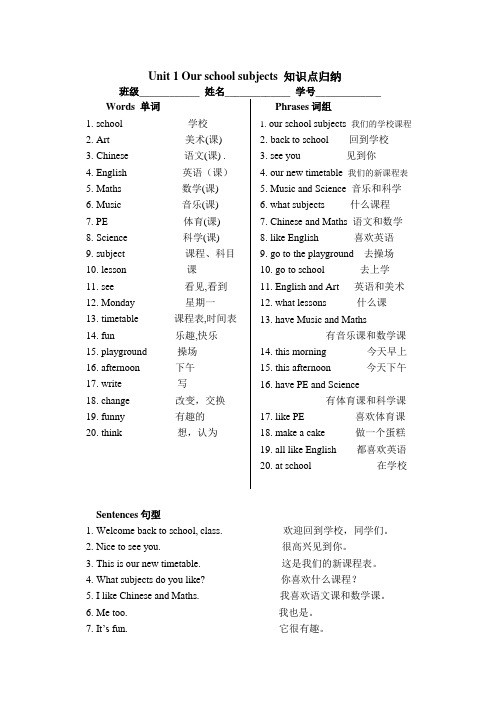
Unit 1 Our school subjects 知识点归纳班级____________ 姓名_____________ 学号_____________Words 单词1. school 学校2. Art 美术(课)3. Chinese 语文(课) .4. English 英语(课)5. Maths 数学(课)6. Music 音乐(课)7. PE 体育(课)8. Science 科学(课)9. subject 课程、科目10. lesson 课11. see 看见,看到12. Monday 星期一13. timetable 课程表,时间表14. fun 乐趣,快乐15. playground 操场16. afternoon 下午17. write 写18. change 改变,交换19. funny 有趣的20. think 想,认为Phrases词组1.our school subjects 我们的学校课程2.back to school 回到学校3. see you 见到你4. our new timetable 我们的新课程表5. Music and Science 音乐和科学6. what subjects 什么课程7. Chinese and Maths 语文和数学8. like English 喜欢英语9. go to the playground 去操场10. go to school 去上学11. English and Art 英语和美术12. what lessons 什么课13. have Music and Maths有音乐课和数学课14. this morning 今天早上15. this afternoon 今天下午16. have PE and Science有体育课和科学课17. like PE 喜欢体育课18. make a cake 做一个蛋糕19. all like English 都喜欢英语20. at school 在学校Sentences句型1. Welcome back to school, class. 欢迎回到学校,同学们。
译林版四年级下册英语知识点归纳
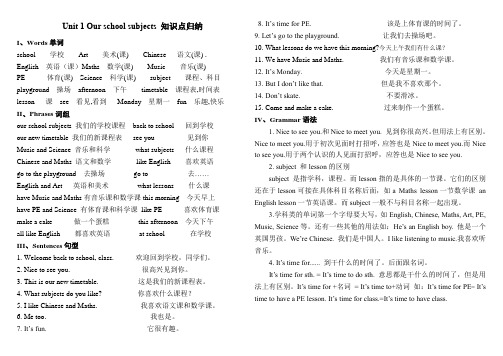
Unit 1 Our school subjects 知识点归纳I、Words单词school 学校Art 美术(课) Chinese 语文(课) . English 英语(课)Maths 数学(课) Music 音乐(课)PE 体育(课) Science 科学(课) subject 课程、科目playground 操场afternoon 下午timetable 课程表,时间表lesson 课see 看见,看到Monday 星期一fun 乐趣,快乐II、Phrases词组our school subjects 我们的学校课程back to school 回到学校our new timetable 我们的新课程表see you 见到你Music and Science 音乐和科学what subjects 什么课程Chinese and Maths 语文和数学like English 喜欢英语go to the playground 去操场go to 去…… English and Art 英语和美术what lessons 什么课have Music and Maths有音乐课和数学课this morning 今天早上have PE and Science 有体育课和科学课like PE 喜欢体育课make a cake 做一个蛋糕this afternoon 今天下午all like English 都喜欢英语at school 在学校III、Sentences句型1. Welcome back to school, class. 欢迎回到学校,同学们。
2. Nice to see you. 很高兴见到你。
3. This is our new timetable. 这是我们的新课程表。
4. What subjects do you like? 你喜欢什么课程?5. I like Chinese and Maths. 我喜欢语文课和数学课。
译林小学英语四下Unit1知识点总结和试卷
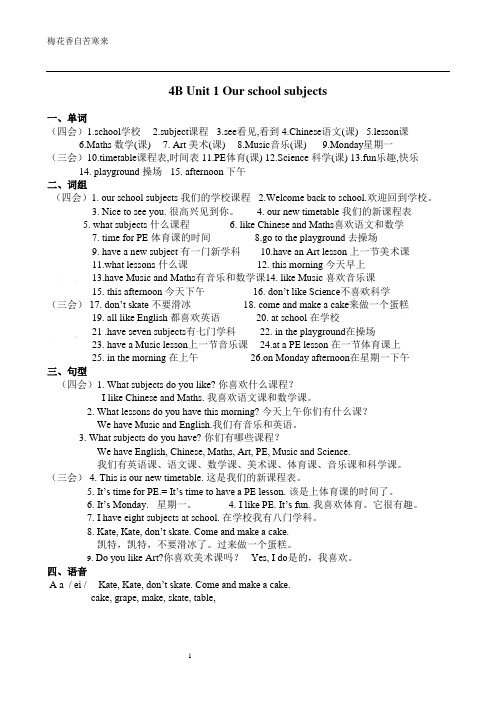
4B Unit 1 Our school subjects一、单词(四会)1.school学校 2.subject课程 3.see看见,看到 4.Chinese语文(课) 5.lesson课6.Maths 数学(课)7. Art 美术(课)8.Music音乐(课)9.Monday星期一(三会)10.timetable课程表,时间表 11.PE体育(课) 12.Science 科学(课) 13.fun乐趣,快乐14. playground 操场15. afternoon 下午二、词组(四会)1. our school subjects 我们的学校课程 2.Welcome back to school.欢迎回到学校。
3. Nice to see you. 很高兴见到你。
4. our new timetable 我们的新课程表5. what subjects 什么课程6. like Chinese and Maths喜欢语文和数学7. time for PE 体育课的时间8.go to the playground 去操场9. have a new subject 有一门新学科10.have an Art lesson 上一节美术课11.what lessons 什么课12. this morning 今天早上13.have Music and Maths有音乐和数学课14. like Music 喜欢音乐课15. this afternoon 今天下午16. don’t like Science不喜欢科学(三会)17. don’t skate 不要滑冰18. come and make a cake来做一个蛋糕19. all like English 都喜欢英语20. at school 在学校21 .have seven subjects有七门学科22. in the playground在操场23. have a Music lesson上一节音乐课24.at a PE lesson 在一节体育课上25. in the morning 在上午26.on Monday afternoon在星期一下午三、句型(四会)1. What subjects do you like? 你喜欢什么课程?I like Chinese and Maths. 我喜欢语文课和数学课。
江苏译林版小学英语四年级下册单元知识点总结

四下Unit 1 Our school subjects重点词句总结一、单词:1.school学校2.subject课程3.back背部;后面4.see看见,看到5.timetable课程表;时间表6.English英语(课)7.Chinese语文(课)8.Maths数学(课) 9.Art美术(课)10.PE体育(课) 11.Music音乐(课)12.Science科学(课)13.fun乐趣,快乐 14.playground操场15.lesson课16.Monday星期一17.afternoon下午二、词组:1. our school subjects 我们的学校课程2. see you 见到你/(再见)3.like Chinese and Maths 喜欢语文和数学4. what subjects 什么课程5. like English 喜欢英语6. time for PE 该上体育课的时间7. have a Music lesson 有/上一堂音乐课8. what lessons 什么课9. have Art and Maths 有美术课和数学课10. my school subjects 我的学校课程11. welcome back to school 欢迎回到学校12. go to the playground 去操场13. our new timetable 我们的新课程表14. have a Science lesson 有/上一堂科学课15. this morning 今天早上16. this afternoon 今天下午17. like PE 喜欢体育课18. don’t like that / do not like that不喜欢那个19. don’t skate 不要滑冰20. make a cake 做一个蛋糕21. at school 在学校 22. all like Computer Studies 都喜欢电脑课23. write the names of some school subjects 写一些学校课程的名称24. ask about school subjects 询问学校课程三、句子:1. Welcome back to school, class. 欢迎回到学校,同学们。
(完整版)译林版四年级下册知识点
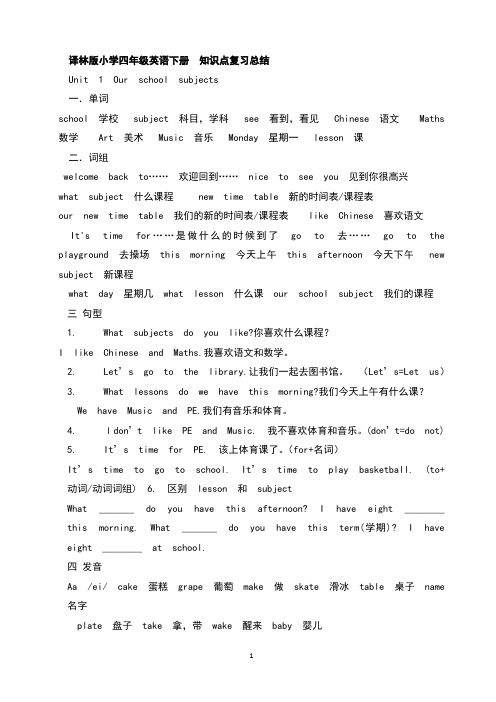
译林版小学四年级英语下册知识点复习总结Unit 1 Our school subjects一.单词school 学校 subject 科目,学科see 看到,看见Chinese 语文Maths 数学 Art 美术Music 音乐 Monday 星期一 lesson 课二.词组welcome back to……欢迎回到……nice to see you 见到你很高兴what subject 什么课程 new time table 新的时间表/课程表our new time table 我们的新的时间表/课程表 like Chinese 喜欢语文It's time for……是做什么的时候到了go to去……go to the playground 去操场this morning 今天上午this afternoon 今天下午 new subject 新课程what day 星期几what lesson 什么课our school subject 我们的课程三句型1.What subjects do you like?你喜欢什么课程?I like Chinese and Maths.我喜欢语文和数学。
2.Let’s go to the library.让我们一起去图书馆。
(Let’s=Let us)3.What lessons do we have this morning?我们今天上午有什么课?We have Music and PE.我们有音乐和体育。
4.Idon’t like PE and Music. 我不喜欢体育和音乐。
(don’t=do not)5.It’s time for PE. 该上体育课了。
(for+名词)It’s time to go to school. It’s time to play basketball. (to+动词/动词词组) 6. 区别lesson 和subjectWhat _______ do you have this afternoon? I have eight ________ this morning. What _______ do you have this term(学期)? I have eight ________ at school.四发音Aa /ei/ cake 蛋糕grape 葡萄make 做skate 滑冰table 桌子name 名字plate 盘子take 拿,带wake 醒来baby 婴儿五练习(一)、单项选择。
译林英语四下Unit1-Unit2学霸必背考点

译林英语四下学霸必背考点Unit 1 Unit 2班级__________ 姓名 ___________ 学号___________Unit 1 Our school subjects一、询问他人喜欢某种课程的句型:句型:What subjects + do/does + + like?主语+like/likes+课程。
例句:1. What subjeets do you like? I/We like Chinese and Music.2. What subjects does Tom like? He likes PE.二、询问某时有什么课的句型:句型:What lessons + do/does +主语+ have + 时间?主语+have/has+具体的课程名称。
例句:1.What lessons do you have tomorrow?We have English, Chinese, Music and PE.2.What lessons does Helen have this afternoon?She has Art and PE.表示时间的词有:today, tomorrow, this morning, /this afternoon, this evening, on Monday, on Tuesday afternoon, in the morning, in the afternoon, in the evening...三、“到做某事的时间了”的表达:句型:It's time for+名词。
It's time to +动词原形+其他。
例句:1. It's time for school. = It's time to go to school2. It's time for lunch. = It's time to have lunch.四、上某种课的表达:用法:“have+课程”表示“上某种课程”或“有某种课”例句:1. We have PE on Monday.2. He has Maths and Art in the afternoon.五、wele的用法:用法:1.表示欢迎首次来的客人时用:“Wele to+某地”表达。
译林版四年级英语下册Unit 1-Unit8知识点汇总

译林版四年级英语下册Unit 1知识点汇总单词school 学校subject 课程Welcome back to …欢迎回到……see 看见,看到timetable 课程表,时间表Chinese 语文(课) Maths 数学(课)Art 美术(课)PE 体育(课)Music 音乐(课)Science 科学(课)fun 乐趣,快乐go to 去……. playground 操场lesson 课Monday 星期一afternoon 下午重点内容词汇分类课程:Chinese语文(课) Maths数学(课) Art美术(课)PE体育(课) Music音乐(课) Science/科学(课) 地点:school 学校playground 操场时间:Monday 星期一afternoon下午其他:see 看见,看到fun 乐趣,快乐subject 课程lesson 课timetable 课程表;时间表句型表达欢迎回到某地的句型:Welcome back to school. Welcome back home.询问对方喜欢什么课程的句型及其答语: What subjects do you like?I/We like Chinese.I/We like Maths.短语go to 去…welcome back to…欢迎回到…our new timetable 我们的新课程表惯用表达式①nice to see you.见到你很高兴。
②What about you?你(们)呢?知识点精析1.表达欢迎回到某地的句型——Welcome back (to)…【课文应用】Welcome back to school, class. 欢迎回到学校,同学们。
【句型结构】Welcome back (to)+地点( school, home,here...)【重点解析】welcome在这里是感叹词,表示“欢迎”to后接表示地点的名词,如果“地点”是副词,to要省略。
苏教版最新译林版小学四年级英语下册4B知识点

苏教版最新译林版小学四年级英语下册4B知识点译林版小学四年级英语下册知识点复习总结Unit1Ourchoolubject一.单词chool学校ubject科目,学科ee看到,看见Chinee语文Math数学Art美术Muic音乐Monday星期一leon课二.词组newubject新课程whatday星期几whatleon什么课ourchoolubject我们的课程三.句型1.Whatubjectdoyoulike你喜欢什么课程?IlikeChineeandMath.我喜欢语文和数学。
2.Let’gotothelibrary.让我们一起去图书馆。
(Let’=Letu)3.Whatleondowehavethimorning我们今天上午有什么课?WehaveMuicandPE.我们有音乐和体育。
What_______doyouhavethiafternoonIhaveeight________thimorning.What_______doyouhavethiterm(学期)Ihaveeight________atchool.四.发音Aa/ei/cake蛋糕grape葡萄make做kate滑冰table桌子name名字plate盘子take拿,带wake醒来baby婴儿五.练习(一)、单项选择。
1.Howmany_______doyouhavethiterm(学期)?Wehavefive.A.ubjectB.aubjectC.ubjectD.anubject5.A:HowmuchitheArtbookB:_____________AIt’five.BThey’refouryuan.C.It’fouryuan.D.Theyarefour6.—What________doyoulike—IlikeEnglih.Itifun.A.ubjectB.ubjectC.aubjectD.anubject(二).连词成句。
译林版英语四年级下册_Unit1-8_知识点梳理

四年级英语下册知识点梳理Unit1 Our school subjects一、重点词组:1. our new timetable 我们的新课表2. an Art lesson 一节美术课3. like Chinese / Maths /English 喜欢语文/数学/英语4. what subjects 什么课程(科目)5. go to the playground 去操场6. what lessons 什么课7. this morning /afternoon /evening 今天早上/下午/晚上8. at school 在学校二、重点句型:1. Welcome back to school. 欢迎回到学校。
2. Nice to see you. 见到你很高兴。
3. It’s time for PE. 该上体育课了。
4. What subjects do you like? 你喜欢什么科目?5. I like Art and Music. 我喜欢美术和音乐三、重点语言知识1. 课程类单词首字母都要大写,如:A rt,C hinese,E nglish等。
2. Welcome back to school. 欢迎回到学校。
Welcome to our school. 欢迎来到我们的学校。
3. Nice to meet you. 用于陌生人首次见面打招呼用语。
Nice to see you. 用于熟人之间好久不见再次见面时打招呼用语。
4. 询问别人意见时可以说:What about you? 和How about you?的用法相近,可以替换使用。
5. 到时间该做某事;It’s time for + 名词;It’s time to + 动词。
例如:It’s time for school. =It’s time to go to school.到时间该上学了。
6. subject 表示“学科,科目”。
译林版四年级英语下册Unit1-8全册知识点汇总
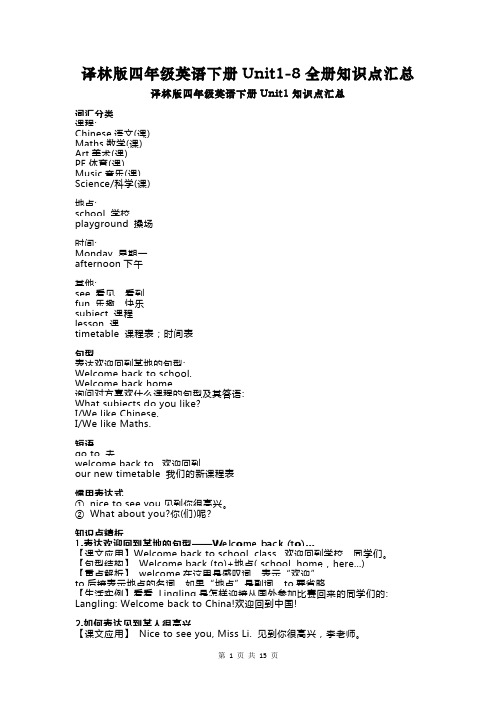
译林版四年级英语下册Unit1-8全册知识点汇总译林版四年级英语下册Unit1知识点汇总词汇分类课程:Chinese语文(课)Maths数学(课)Art美术(课)PE体育(课)Music音乐(课)Science/科学(课)地点:school 学校playground 操场时间:Monday 星期一afternoon下午其他:see 看见,看到fun 乐趣,快乐subject 课程lesson 课timetable 课程表;时间表句型表达欢迎回到某地的句型:Welcome back to school.Welcome back home.询问对方喜欢什么课程的句型及其答语:What subjects do you like?I/We like Chinese.I/We like Maths.短语go to 去…welcome back to…欢迎回到…our new timetable 我们的新课程表惯用表达式①nice to see you.见到你很高兴。
②What about you?你(们)呢?知识点精析1.表达欢迎回到某地的句型——Welcome back (to)…【课文应用】Welcome back to school, class. 欢迎回到学校,同学们。
【句型结构】Welcome back (to)+地点( school, home,here...)【重点解析】welcome在这里是感叹词,表示“欢迎”to后接表示地点的名词,如果“地点”是副词,to要省略。
【生活实例】看看Lingling是怎样迎接从国外参加比赛回来的同学们的: Langling: Welcome back to China!欢迎回到中国!2.如何表达见到某人很高兴【课文应用】Nice to see you, Miss Li. 见到你很高兴,李老师。
Nice to see you too. 见到你们也很高兴。
“Nice to see you”意为“见到你(们)很高兴”,它的答语可以为“Nice to see you too.例如:一Nice to see you here,Miss Zhao. 在这里见到你很高兴,赵老师。
- 1、下载文档前请自行甄别文档内容的完整性,平台不提供额外的编辑、内容补充、找答案等附加服务。
- 2、"仅部分预览"的文档,不可在线预览部分如存在完整性等问题,可反馈申请退款(可完整预览的文档不适用该条件!)。
- 3、如文档侵犯您的权益,请联系客服反馈,我们会尽快为您处理(人工客服工作时间:9:00-18:30)。
译林版小学四年级英语下册-知识点复习总结-(1) Unit 1 Our school subjects一、四会单词school 学校subject 科目,学科see 看到,看见Chinese 语文Maths 数学Art 美术Music 音乐Monday 星期一lesson 课二、句型1. What subjects do you like?你喜欢什么课程?I like Chinese and Maths.我喜欢语文和数学。
2. Let’s go to the library.让我们一起去图书馆。
(Let’s=Let us)3. What lessons do we have this morning?我们今天上午有什么课?We have Music and PE.我们有音乐和体育。
4. Idon’t like PE and Music. 我不喜欢体育和音乐。
(don’t=do not)三.语言点1. It’s time for school. (for+名词)It’s time to go to school. It’s time to play basketball. (to+动词/动词词组)2.区别lesson 和subjectWhat _______ do you have this afternoon? I have eight ________ this morning. What _______ do you have this term(学期)? I have eight ________ at school.四、短语欢迎回到……new timetable 新的课程表what subjects 什么学科like Chinese 喜欢语文what about ……怎么样It’s time for …该…….的时候了go to the playgroud 去操场what lessons 什么课this morning 今天早上like Music 喜欢音乐课this afternoon 今天下午nice to see you 见到你很高兴our new time table 我们的新的时间表/课程表It's time for……是做什么的时候到了go to the playground 去操场me too 我也是new subject 新课程what day 星期几our school subject 我们的课程五、发音Aa /ei/ cake 蛋糕grape 葡萄make 做skate 滑冰table 桌子name 名字plate 盘子take 拿,带wake 醒来baby 婴儿Unit 2 After school一、四会单词Monday 星期一Tuesday 星期二Wednesday 星期三Thursday 星期三Friday 星期五Saturday 星期六Sunday 星期日get up 起床二、句型1. What day is it today? 今天星期几?It’s+星期几。
It's Friday.2. She has a skating lesson. 她有一堂溜冰课。
3. We don’t have any lessons on Wednesday.我们在星期三没有课。
4. Let’s go and play table tennis.让我们去打乒乓球。
5. I have a basketball match today. 今天我有一场篮球比赛。
6. When do you get up every day? 你每天几点起床?7. I get up at five. / At five. 我五点钟起床。
三.语言点。
1. I have a PE lesson.我有一堂体育课。
2. Helen has an English lesson.海伦有一节英语课。
(第三人称单数做主语,用has 表示“有”)四、短语play table tennis 打乒乓球what day 星期几a football match 一场足球比赛 a swimming lesson 一节游泳课all right 好的get up 起床good morning 早上好every day 每天at five 在五点钟what lessons 什么课on Saturday 在星期六play table tennis 打乒乓球what day is it today? 今天星期几?来打乒乓球what a pity 真遗憾at school 在学校after school 放学后五、发音Aa / æ / bag书包cap 帽子hamburger 汉堡包sandwich 三明治snack 快餐dad 爸爸Maths 数学match 比赛Saturday 星期六apple 苹果Unit 3 My day一、四会单词usually 通常常常homework 家庭作业二、句型1. When do you get up in the morning?你上午什么时候起床?2. I have lunch at twelve fifteen. 我在12 点15 分吃午饭。
3. I usually go to school at seven forty.我通常在7 点40 去学校。
4. I have dinner at six fifteen and watch TV at seven. 我6 点15 分吃晚饭,并且在7 点看电视。
5. What time is it now?现在几点?6. What a big cake!多么大的一个蛋糕啊!三. 语言点。
1. I get up at six o’clock. 我六点起床。
(英语句子中,时间表达放在句末。
)2. I go to bed at nine on Friday. 我星期五九点睡觉。
(一句话中如果有两个时间,小时间放在大时间之前。
)3. at nine twenty 在九点二十( 时间点的前面用介词at )4. 时间的表达。
十点三十二分ten thirty-two 七点五十八分seven fifty-eight四、短语go to school 上学at seven forty 在七点四十分in the morning 在早上have lunch 吃午饭in the afternoon 在下午do my homework 做家庭作业have dinner 吃晚饭every day 每天what time 什么时间over there 在那边 a big cake 一块大蛋糕like cakes 喜欢蛋糕my day 我的一天four lessons 四节课five subjects 四门课程at seven 在七点watch TV 看电视go to bed 睡觉play football 踢足球in the evening 在晚上at night 在夜里五、发音E e / i: / me 我she 她green 睡觉sleep 睡觉three 三week 星期,周see 看到meet 遇见evening 晚上Unit 4 Drawing in the park一、四会单词park 公园draw 画flower 花them 他们,她们,它们boat 小船river 河,江lake 湖,湖泊二、句型1. Let’s draw some pictures here.让我们在这里画画。
2. What can you see over there? 你能看到在那里有什么?3. I can see a lake.我能看见一个湖泊。
4. It’s difficult, but I can try. 这难,但是我可以试一试。
5. Can you draw them? 你会画它们吗?6. What can you see? 你能看见什么?What can you do? 你能做什么?I can see a tree.我能看见一棵树。
I can draw. 我会画画。
三.语言点。
the boat on the river 湖面上的船(名词性词组)before 反after四、短语draw some pictures 画一些画good idea 好主意over there 那边some flowers 一些花draw them 画它们on the river 在河面上this big box 这只大盒子have a look 看一看on the lake 在湖面上try again 再试一试in the park 在公园里some pictures 一些图画well done 好样的,干得好can you draw 你会画吗?in the boat 在小船里drawing in the park 在公园里画画a tree 一棵树five trees 五棵树on the hill 在小山上see a boat 看到一条小船make a cake 做一个蛋糕before ten 十点之前五、发音e / e / bed 床desk 课桌,书桌pen 钢笔red 红色的ten 十friend 朋友them 他们pencil 铅笔Wednesday 星期三欢迎Unit 5 Seasons一、四会单词season 季节spring 春天,春季warm 温暖summer 夏天hot 热的,炎热的autumn 秋天,秋季cool 凉爽的,凉快的winter 冬天,冬季cold 冷的二、四会句型1. In spring, it is warm. / It is warm in spring. 在春季,天气温暖。
2. In summer, it is hot. / It is hot in summer. 在夏季,天气炎热。
3. In autumn, it is cool. / It is cool in autumn. 在秋季,天气凉爽。
4. In winter, it is cold. / It is cold in winter. 在冬季,天气寒冷。
5. We fly kites. 我们放风筝。
We can eat ice creams.我们能吃冰淇淋。
6. I/We like autumn. 我/我们喜欢秋天。
7. It’s a fine day today. 今天是晴朗的一天。
三,语言点。
1. 季节的前面使用介词in。
in spring/ summer/autumn/winter2. 英语表达中,时间一般放在句末。
I go boating in spring .3. 如果时间表达放在句首,一定要用逗号和后面的分局隔开。
